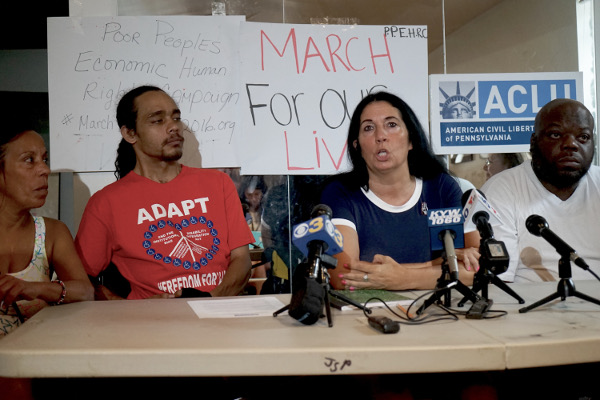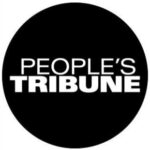
Editor’s note: After the March for Our Lives and the Democratic National Convention, the People’s Tribune interviewed Cheri Honkala, the director of the Poor Peoples Economic Human Rights Campaign.
People’s Tribune: Describe the poverty in Philadelphia and around the country that you addressed with the March for Our Lives.
Cheri Honkala: Poverty is devastating Philadelphia. It is the poorest large city in the U.S., and number one in death by drug overdoses. Poverty is growing everywhere I travel, in Baltimore, Virginia, Ohio, and New York. Recovery programs are getting shut down, housing programs are cut, and shelters are overcrowded everywhere. People are being denied health care. A lot can’t afford to buy Obamacare, so they have no health care and then they get a tax penalty at the end of the year.
PT: What Happened at the March for Our Lives?
CH: This year there were lots of young people, and lots more expressions of political independence from the two party system. The Democrats always corral low-income people through their programs, but now, when the programs are cut they are losing their hold over them. The youth brought a lot of energy to the march and a lot of support to our campaign against poverty. Most of them were for Bernie, and they got their hearts ripped out when he endorsed Hillary Clinton. They are desperate for change, and they can’t get change in the two party system. We can’t go back, we have to go forward, and we are still feeling out what that means and where we go from here.
PT: How did people respond to the Democratic National Convention?
A lot of people experienced a change in consciousness. They said, “Oh my God, the corporations have taken over both parties!” It was like a loss of innocence. At one point, 2000 people were outside chanting “Jill, not Hill!” for the Green Party candidate, Jill Stein. There were young people, people with disabilities, and homeless people. This is an important moment for our country. People will look back at 2016 and say, this is when the two party system started to change. People are looking for a new kind of politics, a politics that doesn’t take money from corporations and doesn’t sell itself to billionaires. This is where the movement has to go if we want to end the poverty that is crushing our people.
Desperate for Change: Interview with front-line fighter to end poverty
Latest
The People’s Tribune opens its pages to voices of the movement for change. Our articles are written by individuals or organizations, along with our own reporting. Bylined articles reflect the views of the authors. Articles entitled “From the Editors” reflect the views of the editorial board. Please credit the source when sharing: peoplestribune.org. Please donate to help us keep bringing you voices of the movement for change. Click here. We’re all volunteer, no paid staff. The People’s Tribune is a 501C4 organization.

